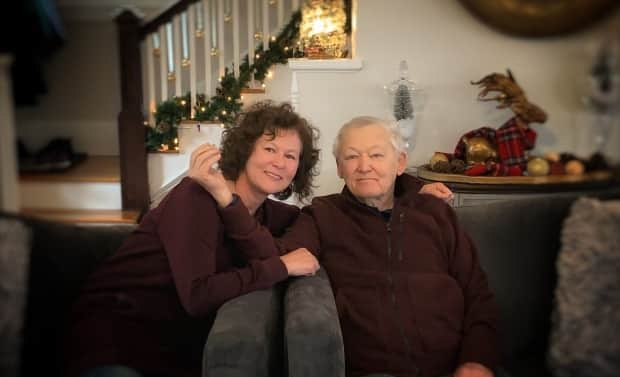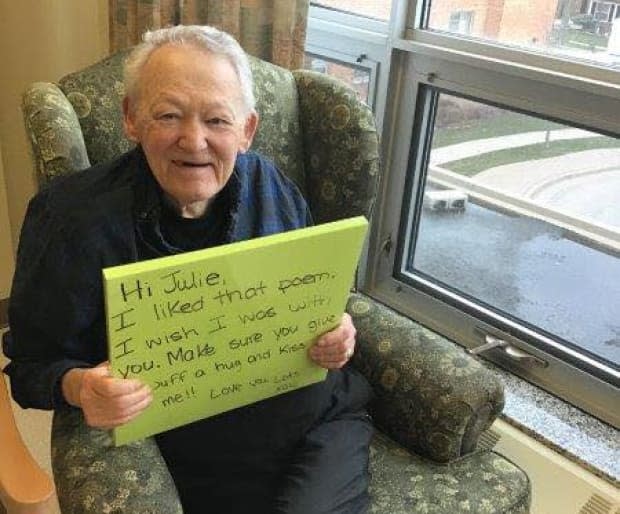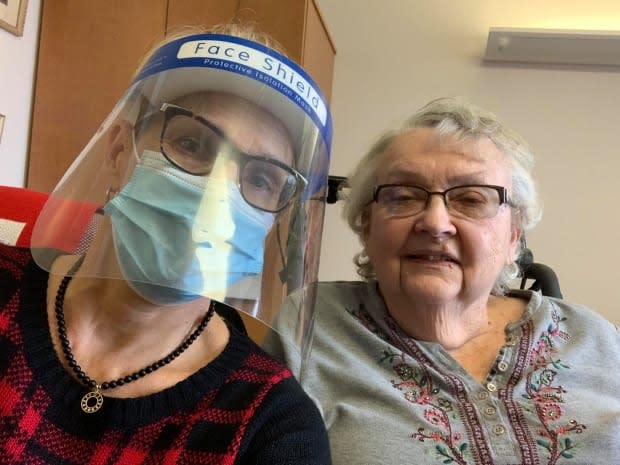This seniors' home in Windsor-Essex kept COVID-19 out, but doing so has come at a cost

When the dementia made 81-year-old William Gibb wander outside his room this past year, it meant that he would likely fall and hurt himself.
Yet, when his daughter Julie Gibb and her husband chased after him, they were "reprimanded" for breaking strict COVID-19 rules by staff at Richmond Terrace, a long-term care home in Amherstburg where William is a resident.
"[We] were told just to let him fall because we weren't allowed in the hallways. We had to remain in dad's room for the duration of our visit," Julie said.
As 19 seniors' homes in Windsor-Essex continue to be ravaged by COVID-19, Richmond Terrace has accomplished an admirable feat: staying all but COVID-free since the start of the pandemic.
Unlike the 18 other long-term care homes in the region, Richmond Terrace has kept its 128 residents and between 130 and 150 staff safe. But doing so came at a cost for some — of isolation, mental health, residents' rights and what one family called being alive but not living.
The home said it went "above and beyond" directives from the Ministry of Long-Term care to safeguard its residents, but at times it was so restrictive that it kept some essential caregivers out and prevented residents from leaving the home.
The home's approach, and reaction by some families, reflects the tensions and dilemmas over safety and mental health created by the pandemic.
The home did have a scare mid-December and went into outbreak mode when a staff member tested positive, but no transmission occurred in the home and the employee had never been in the building after being swabbed.
The provincial website does list the home as previously being in outbreak, but APANS Health Services, which operates the home, says it has not.
With vaccinations underway in the region, Richmond Terrace is now in the final stretch and could make it out unscathed.
Yet, while the home kept the disease out, Julie says the home was very strict and that led to confinement and isolation that she says rapidly progressed her father's dementia.
While the home kept her father alive, she said he's "no longer living."
"I still think all the way along they could have been a little bit more open, that's just me though," she said.
"I know that it would have been better for my dad but probably other family members would disagree, other family members might think they've done an awesome job and keeping COVID out was probably the most important thing — for me I just see people who are merely alive and no longer living and I know my dad would have wanted more."

But she's not the only one upset about some of the home's pandemic measures.
A publicly available Nov. 17 report shows that Richmond Terrace was inspected a number of times throughout September and October in 2020 based on several complaints, many of which had to do with visitation procedures and alleged policies that violated resident rights.
More stringent
In an interview with CBC News, CEO of APANS Health Services Mary Raithby, says she would do it all over again, just to keep residents safe.
"We do understand that the directives are put out through the ministry for a reason and we believe that those are the minimum standard and that as an organization we need to do whatever we feel is necessary to keep our staff and residents safe," she said.
"We did implement practices that were, I would say, more stringent than the directives, and complaints were made and the ministry did inspect and required us to cease, which we have done."
Raithby continued to say that she understands the importance of having visitors and residents staying socially distant but believes the "sacrifice of some of those privileges were necessary to keep people safe."
Family member Donna Rivard, who is the daughter of 82-year-old Richmond Terrace resident Dianne Wright, says she is pleased with the home.
"It's nothing but positive and kudos to the staff to everything. Was it difficult? Yes. But it's kept my mom safe up to this point and they can put whatever rule they want in place if it's going to keep her safe," she said, adding that she did not personally experience any issues at the home.

Some restrictions went against resident rights
In the inspection report, several instances of strict measures were highlighted.
In one case, family members had complained that the home was not allowing some residents' essential caregivers, who also happened to be frontline healthcare workers at other facilities, to enter the home for "IPAC (infection prevention and control) reasons."
While the government has restricted healthcare employees from working at more than one facility, there is no rule prohibiting them from being an essential caregiver.
As a result, the inspection found that the home had no basis to deny these caregivers.
In another instance the home required a resident to quarantine after it discovered that the person had taken their mask off to eat when attending an appointment outside the home.
Yet, there was no ministry directive at the time that required the resident to be quarantined after the appointment nor was there any policy that stated masks could not be removed.
But the home, according to the inspection report, said it was an IPAC "risk" and that "their own policies were clear that masks were not to be removed while outside the home, even to eat."
"The home encouraged the person responsible for the resident while out, to return the resident to the home to eat food prepared by them if they needed to eat, and then go back out to their activities and then return the resident back to the home when the outing was finished," the report states.
WATCH: Julie Gibb talks about the home's COVID-19 precautions
Other cases found that family members were unable to have private meetings with residents as staff were directed to supervise visits to "ensure that IPAC practices and social distance were maintained."
A final situation that was reviewed found that the home refused a resident to leave as the person taking them out did not have a COVID-19 test.
In response to this, an interim administrator at the home said, "[the home has] gone above and beyond their policy to safeguard their residents and are declining to allow people that have not been tested for COVID-19 to take a resident out of the home. The home stated that their short stay policy is in compliance with the Directives and is what is best, IPAC speaking, for all the residents in the home."
President of Unifor Local 2458 Tullio DiPonti, who represents workers in Richmond Terrace, says he's not aware of these complaints but is proud of the job that workers and the home did to keep residents safe.
"I'd rather see residents alive, than dead and whichever way we had to keep these residents alive that's up to the administration to make sure that they follow every guideline ... but as someone who had a family member in long-term care before I would be a very happy person knowing that my mom or my dad was alive and safe."
Death by loneliness
In response to these reports, Dr. Samir Sinha, director of geriatrics at Sinai Health and University Health Network in Toronto, said while the home escaped COVID-19 it seems its residents were likely dying from something else.
"The challenge is even when you've had some homes that say 'yay, we haven't had any COVID,' the question is well, what did they actually have and what actually happened as a result?" he said.
"So the home can proudly say we haven't had a COVID outbreak, but everybody in that home might be dying of loneliness and they might have other conditions that might have worsened or progressed."
Sinha said across Ontario there is evidence of increased depression, functional decline and progressed dementia in seniors.
Yet Raithby said the home ensured residents stayed social and connected to family through window visits, video and phone calls and outdoor visits.
The intent, she said, was to keep residents safe and that meant adopting virtual means.

Sinha said the fact that this home and others went "above and beyond" is great, but it depends on what that means — if it involves going against ministry directives and resident rights, then it shouldn't have been done.
"If they're going above and beyond by doubling the usual amount of cleaning they're doing, I think that's a great thing," he said.
"[But] when home's say we've gone above and beyond by shutting out visitors or excuses to not allow visitors to come visit or essential family caregivers to provide the support and care, we're actually seeing that that creates more risks."
All of this could have been avoided if the home simply treated its caregivers like staff, Sinha said, adding that they just had to ensure people understood IPAC measures, wore the proper personal protective equipment and were appropriately screened.

